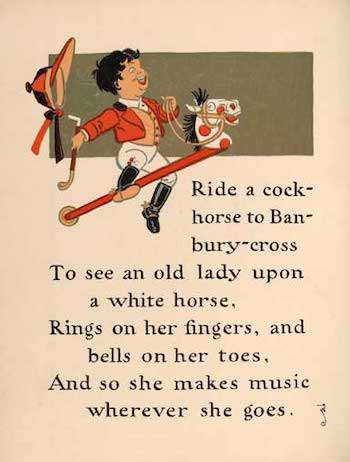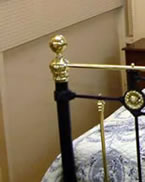With bells on
What's the meaning of the phrase 'With bells on'?
Eager; ready to participate.
What's the origin of the phrase 'With bells on'?
This phrase is frequently used in reply to a welcome invitation - "I'll be there with bells on!".
 It is sometimes suggested that the expression derives from the nursery rhyme Banbury Cross:
It is sometimes suggested that the expression derives from the nursery rhyme Banbury Cross:
Ride a ****-horse to Banbury Cross,
To see a fine lady upon a white horse;
Rings on her fingers and bells on her toes,
And she shall have music wherever she goes
[Note: the **** is inserted to comply with Google's publishing guidelines. Ridiculous I know for a nursery rhyme lyric.]
Various version of the rhyme have been in use since the 1700s but the 'bells on her toes' variant is only known since 1901. The rhyme doesn't include the phrase so the best I can say for that derivation is 'close but no cigar'.
The first record of it that I have found in print of the phrase itself is from The Oakland Trbune, June 1904, in a report of a boxing match:
"Jeff will without doubt be in good condition by the last of the month and barring further accidents will be there with bells on".
The phrase is paralleled in the UK by 'with knobs on', which means, 'with additional ornament'. This is recorded from the 1930s onward, as in the English novelist Margaret Kennedy's The Fool of the Family, 1930:
"I'm waiting for the Marchese Ferdinando Emanuele Maria Bonaventura Donzati." "With knobs on," agreed Gemma airily. "Who's he?"
The ornamentation is sometimes added to, using the intensified form 'with brass knobs on'. Eric Partridge, in A Dictionary of Catch Phrases, 1977, states that 'with brass fittings' was also known in the USA by 1930, but unfortunately omits any documentary evidence and, as yet, I've been unable to verify that assertion.
Whilst 'with bells on' is largely reserved as being an enthusiastic response or as indicating additional ornament, both it and 'with (brass) knobs on' are also used as aggressive responses to a challenge. One might hear all of these in conversation - or rather one might have heard, as all versions are now falling out of use:
"Your 21st? - I'll be there with bells on".
"Freddie Mercury was Mica with bells/brass knobs on" and
"You incompetent dummy!". "Same to you with bells/brass knobs on!".
 The knobs in the above are fairly easy to identify. The allusion is to the iron bedsteads which were commonplace items of furniture at the time the term was coined. The better class examples were embellished with brass knobs at the top of each bedpost.
The knobs in the above are fairly easy to identify. The allusion is to the iron bedsteads which were commonplace items of furniture at the time the term was coined. The better class examples were embellished with brass knobs at the top of each bedpost.
The 'bells' derivation is less clear-cut. Bells are often used to indicate ornament or exuberance, as in the late 20th century phrase 'bells and whistles' and the earlier British expression 'pull the other one [leg], it's got bells on'.
The explanation most often put forward as the source of the bells in 'with bells on' is that they were those worn as part of jesters' costumes. The 'going to a party' scenario certainly fits with that. However, the distance in time and place between the world of medieval court jesters and the emergence of the phrase in 20th century USA tends to call that explanation into question. Of course. many things had bells on and, like the 'yards' of 'the whole nine yards', people aren't shy of suggesting their favourite. Correspondence I've had on this includes these suggested origins:
- The high priests of the Jews were required to wear bells along the hem of their priestly robes. When performing their duties, they had to keep moving so that the bells could be heard. If the bells stopped, that meant the high priest had done something illegal in the eyes if God and had died.
- Another speculative suggestion along similar lines is that the bells are the bell-bottomed trousers that were worn by sailors. The US Navy and the British Royal Navy both issued bell-bottoms for their sailors in the 19th century but, that aside, there's nothing to support a naval origin. 'Pull the other one, it's got bells on' seems an apt response there.
While the above are plausible, they are no more so than any other scenario that includes bells. Two stronger contenders, and they are stronger by dint of their emergence in the right place at the right time, that is, the USA in the late 19th/early 20th centuries and because the circumstances match the meaning of the phrase, are these:
- Bells that were added decoratively to the harnesses of horses in parades and especially in circuses or other gala circumstances, as depicted on old Christmas cards and the like. Someone coming to a party 'with bells on' wasn't just coming, he was planning to come in with a flourish to boost the festive spirit.
- The settlement of US immigrants in Pennsylvania and other states. Their preferred means of transport were large, sturdy wooden carts, called Conestoga wagons. These were drawn by teams of horses or mules whose collars were fitted with headdresses of bells. George Stumway, in Conestoga Wagon 1750-1850, states that the wagoners personalised the bells to tunings of their liking and took great pride in them. If a wagon became stuck, a teamster who came to the rescue often asked for a set of bells as reward. Arriving at a destination without one's bells hurt a driver's professional pride, whereas getting there 'with bells on' was a source of satisfaction.
Circumstantial evidence is the best we have at present so, as they say, the jury is still out.
Page last updated 24/June/2008.

